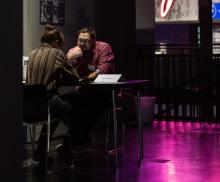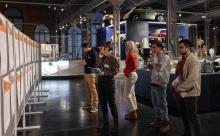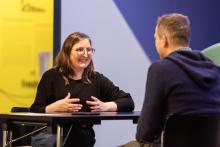Is hydrogen dangerous? How can 3D printing be used sensibly in the energy transition? Why are we often unable to act the way we actually want to? At a science communication format, the Salon der Wissenschaft, organised by Power 2 change - Mission Energiewende and Wissenschaft im Dialog GmbH, three experts from TUBAF discussed the future of energy with visitors to the Chemnitz Industrial Museum. Not in a lecture, however, but in 15-minute personal talks that museum visitors could book in advance with the researchers. The participants did not know in advance who would be sitting opposite the scientists and with what questions. Here, Dr Sven Eckart, Prof Gari Walkowitz and Prof Henning Zeidler describe their experiences with the format.

"Discussing, questioning and looking for new perspectives together - that's how the organisers described their objective in the enquiry," says Dr Sven Eckart. "Taking part in a public "speed dating format" in the museum with unknown discussion partners was new for me, but in retrospect very interesting," says the Head of Combustion Technology at the Chair of Gas and Heating Technology. "The discussion partners asked questions about my specialism that I wouldn't have come across otherwise. I think this form of dialogue is important for questioning one's own research, placing it in a wider context and not losing sight of the relevance of one's own topics for the general public. The experience has also shown me how important it is to communicate scientific findings at an understandable level."
Listening takes centre stage
"I learnt from the format how important it is to listen. In the four conversations, it was essential to moderate the narrative and understand what moves the other person on the topic. This type of exchange is important because the storytellers realise that their views are relevant to the social and economic sciences and are taken seriously," says Prof. Gari Walkowitz. For the research mission of his Chair of Behavioural and Business Ethics, he goes even further: "The discussions made it clear how important research into the acceptance of new technologies is. Because the technical solutions are there, but due to scepticism, previous experience and a lack of acceptance, they often cannot be implemented at a local level and are therefore not accessible to large sections of the population."

New perspective on research questions
Professor Henning Zeidler also got involved in the format: "As you don't know the dialogue partners and their backgrounds beforehand, it is of course always necessary to reorientate and engage with each other. I found the discussions to be consistently pleasant and open. The people were very positive about the topic of sustainability." What else did he take away from the speed dating at the museum? "For me personally, the conversations did indeed result in new perspectives on our research questions - and a new way of networking beyond our own horizons."
The event took place at the beginning of November as part of the exhibition Power2change. The travelling exhibition can be seen until 1 December 2024 at the Chemnitz Industrial Museum.
